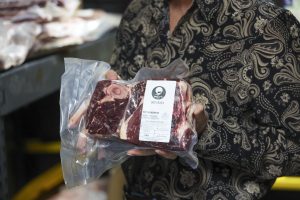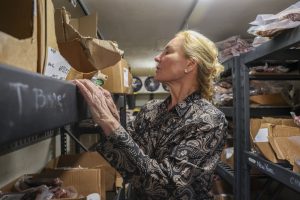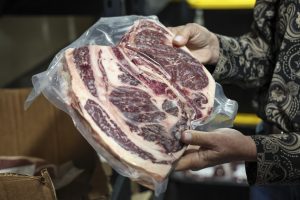- Slug: BC-CNS-Alternative Meat Labeling. 760 words.
- Photos available (thumbnails, captions below).
- Video available.
By Sadie Buggle
Cronkite News
PHOENIX – In response to the surging popularity of lab-grown meat and plant-based alternatives, Arizona Rep. Quang Nguyen, R-Prescott Valley, has introduced a bill seeking to impose stricter regulations on the labeling and representation of such products.
HB 2244 aims to prevent “intentionally misrepresenting” food items not derived from traditional livestock or poultry as meat or animal products. This legislation would apply to lab-grown meat created from the cells of animals as well as plant-based meats or synthetic alternatives derived from insects or other sources.
“I’m not banning anything,” Nguyen said. “I’m just saying, ‘Hey, I want to be able to walk in the grocery store as a consumer and be able to see this is lab-grown, this is bugs, this is plant-based.’ That’s all.”
This misrepresentation can include affixing false or misleading labels and using terms that are “deceptively similar” to terms historically used in reference to meat products.
According to Nguyen, the issue is a matter of transparency. Though the Food and Drug Administration has established labeling standards for cell-cultured food products, Nguyen argues that these regulations are insufficient in informing consumers about the source of lab-grown meat.
The bill passed the Arizona House on Feb. 1, then failed in the Senate on a 15-15 vote, before a motion to reconsider kept it alive on April 2. As the bill moves through the legislative process, stakeholders continue to weigh the balance between consumer transparency, innovation and regulatory oversight in the food industry.
Though some environmental activists believe that lab-grown meat is an effective way to produce food products with fewer emissions and animal slaughter, others worry that the practice will have a detrimental effect on the ranching and agriculture industries.
Lisa Khan is the owner of Arizona company Moon River Beef, a family-run cattle business that prioritizes sustainability and raising cattle in an environmentally conscious way. Khan underscored the importance of transparent labeling for consumers to make well-informed choices.
“It will give the consumer a choice, but an informed choice so that if they might be from an animal, they know where to go and they’re not making a mistake,” Khan said.
Khan expressed concerns about the future of ranchers in the industry, referring to them as “stewards of the environment.” With the increasing popularity of meat alternatives and the sale of more ranches in response, she said that the legislation would help individuals knowingly support ranchers.
“If you’re going to … push for plant-based meat and cultured meat, it’s going to shift sales away from ranchers and limit their livelihood,” Khan said. “We want to maintain their livelihood because it’s being pushed in so many different directions. They’re selling their beautiful ranches for parking lots and industrial buildings. You can see that all over the state of Arizona, and it’s really sorry.”
However, critics of the bill, such as Rep. Alexander Kolodin, R-Scottsdale, have voiced concerns about the legislation being unconstitutionally vague and overly broad and suggested that the bill could hinder innovation in the food industry.
“If I were to take, say, veggie burgers, and I would say, ‘meaty veggie burgers,’ is that misrepresenting the product as meat?” Kolodin asked during a House Land, Agriculture and Rural Affairs committee meeting on the bill in January.
Drake Jamali, a lobbyist representing the Good Food Institute – a nonprofit focused on promoting plant-based and cultivated meat alternatives – cautioned lawmakers against the potential consequences of HB 2244, suggesting that it broadly restricted the use of terms such as “patties” or “nuggets,” even when packaging clearly indicates the product’s nature.
“These products use terms like nuggets, patty, burger, meat, etc., because consumers are familiar with them,” Jamali said. “Companies are not in the business of misleading consumers. And that’s why they use corresponding qualifying terms, such as plant-based, dairy-free or self-cultivated – to inform consumers of what they’re buying.”
Another Arizona bill attempted to take even harsher measures to limit alternative meat. HB 2121, introduced by Rep. David Marshall, R-Snowflake, aimed to ban the sale or production of lab-grown meat altogether, but the bill fizzled out in the Senate.
Both measures reflect a national ongoing debate surrounding transparency in labeling and regulation of meat alternatives, as the FDA approved the sale of lab-grown meat products in June 2023.
“We need our legislators to back it (the bill) up and make sure … that everything gets labeled properly,” Khan said of HB 2244. “There’s a lot of small mom-and-pop markets here still. It’s just an added layer of oversight, that’s all. It’s not going to do any harm.”
For more stories from Cronkite News, visit cronkitenews.azpbs.org.


